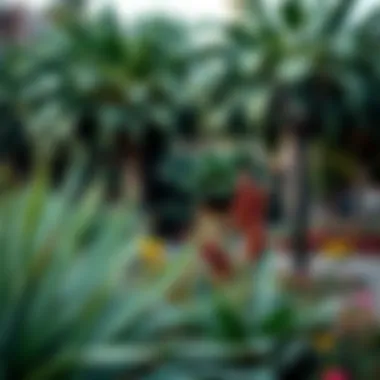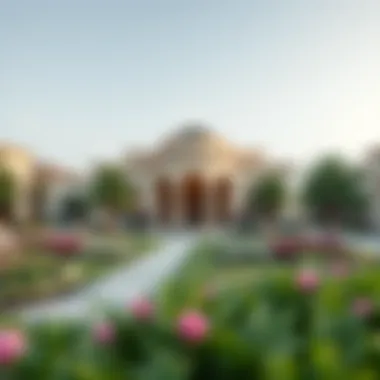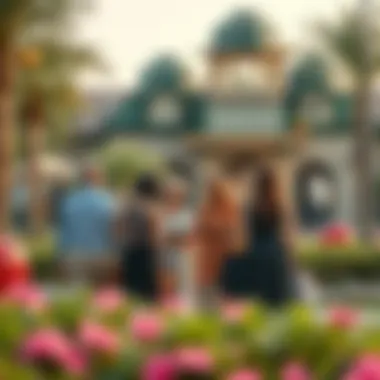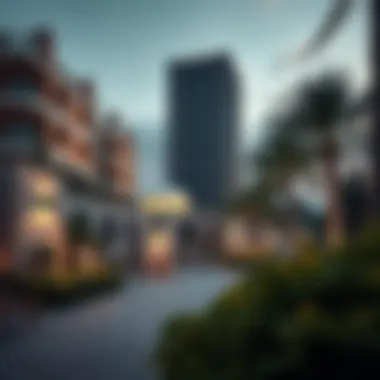Discovering the Gardens of Jebel Ali: A Detailed Overview


Intro
The allure of green spaces in urban areas cannot be overstated, particularly in fast-developing regions like Jebel Ali. Gardens serve as the lungs of a community, providing not only a sanctuary of tranquillity but also playing a crucial role in enhancing the overall quality of life for its residents. In Jebel Ali, the gardens reflect the marriage of design, ecological significance, and historical context, contributing immensely to the local culture.
Located in Dubai, Jebel Ali is known primarily for its port and industrial zones. However, it is also home to a variety of gardens that stand as a testament to thoughtful landscaping practices and ecological awareness. This section aims to shine a light on the green oases that bring joy and relaxation to those who live and visit here. In exploring the effectiveness of these spaces, our aim is to highlight the multi-faceted benefits they offer, particularly for investors, home buyers, and gardening enthusiasts who appreciate the balance between nature and urban life.
The gardens of Jebel Ali are not just patches of green; they are integral parts of the community's narrative. From historical gardens that harbor stories of the past to modern designs that embrace sustainability, they mirror the evolution of Jebel Ali. Furthermore, these green havens offer excellent investment opportunities that savvy investors should not overlook, as they have a profound impact on property values in the surrounding areas.
As we navigate through the varying types of gardens, landscaping strategies, and their socio-economic contributions, this exploration will provide a comprehensive understanding of why the gardens of Jebel Ali deserve a spotlight. Each section will approach different themes, giving you insights that can help inform better investment decisions and immerse you in the serene experience that these gardens provide.
Preface to Jebel Ali Gardens
Gardens of Jebel Ali stand as a testament to nature’s ability to thrive amidst the rapid urbanization of the United Arab Emirates. They serve not just as attractive landscapes but also as vital ecological spaces enriching the surrounding community. This section sheds light on the relevance of these gardens, especially for residents, investors, and urban planners alike. Understanding these gardens is vital when one considers both their ecological benefits and their role in enhancing quality of life in a busy metropolis.
Geographical Context
Jebel Ali is strategically located along the coast, just south of the bustling city of Dubai. The area benefits from a diverse climate that supports a variety of plant species. Encompassing extensive green spaces, these gardens contribute to a cooler microclimate that provides relief from the intense heat, especially in the summer months.
When one strolls through the pathways of Jebel Ali’s gardens, the geographical influences are evident. The sandy soil and proximity to the Arabian Gulf allow for a blend of desert plants intertwined with greenery from more temperate zones. In many ways, these gardens act as an oasis in an urban environment, promoting biodiversity. The flora not only beautifies the area but also invites local wildlife, from birds to tiny insects, enriching the local ecosystem.
Location plays a critical role here. Proximity to major highways and the Abu Dhabi-Dubai corridor means that these gardens are easily accessible, appealing to residents and visitors alike who are seeking a slice of nature without straying too far from urban convenience.
Historical Significance
The historical roots of Jebel Ali resonate with the journey of a nation transforming from a modest fishing and trading post into a global metropolis. Initially, the development of green spaces in the region was limited; however, as the city flourished, so did the understanding of the need for eco-friendly urban planning. Gardens began surfacing as a response to the increasing demand for recreational spaces.
Sepcial initiatives by local government and community organizations drove the creation of these gardens. It’s interesting to note how these gardens have evolved over the years—what might once have been simple patches of grass have transformed into well-thought-out landscapes that invite people to gather, explore, and engage with nature.
The gardens not only enhance visual aesthetics but also serve as venues for cultural events and community gatherings. For both longtime residents and newcomers, these spaces are a reminder of the rich tapestry of life that exists beyond the skyscrapers and city lights. They symbolize a commitment to preserving the cultural identity of Jebel Ali while embracing modernization.
Types of Gardens in Jebel Ali
The gardens in Jebel Ali represent a diverse tapestry of green spaces, each with its own unique charm and function. These gardens serve not just as places of beauty but also as vital components of the urban landscape. They provide numerous benefits, enhancing the quality of life for residents and visitors alike. This section delves into the three primary types of gardens found in the region: botanical gardens, community gardens, and private gardens. Each type plays a distinctive role in the ecological, social, and economic fabric of Jebel Ali.
Botanical Gardens
Botanical gardens in Jebel Ali are not just scattered patches of greenery; they're vibrant living museums. These spaces are meticulously designed to showcase a wide array of plant species. Visitors can wander through curated collections, ranging from local flora to exotic plants from all over the globe. A perfect example is the Dubai Miracle Garden, featuring stunning floral displays that bloom in vibrant colors every year.
The significance of these gardens transcends mere aesthetics. They are crucial for conservation efforts, as they often house endangered species and serve as research hubs for horticulturists and environmental scientists. By raising awareness about biodiversity, botanical gardens help educate the public about environmental stewardship and sustainability.
- Promoting conservation awareness
- Facilitating scientific research
- Encouraging public education on botany
Community Gardens
In the bustling environment of Jebel Ali, community gardens offer a literal breath of fresh air. These gardens are typically cultivated by local residents who come together to grow fruits, vegetables, and flowers. They're more than just plots of land; they're a gathering place where neighbors connect, share knowledge, and foster relationships. For instance, the Jebel Ali Community Garden invites residents of all ages to participate, contributing to a shared sense of ownership and pride.
Community gardens also play a vital role in promoting food security. By providing spaces for people to grow their own produce, they reduce dependence on external sources and inspire healthier eating habits. Moreover, they can also assist in local education initiatives, teaching children and adults alike about gardening techniques and the importance of local produce.


- Strengthening community bonds
- Enhancing urban food security
- Providing educational opportunities
Private Gardens
Private gardens in Jebel Ali are a testament to individual expression and creativity. Homeowners cultivate their own green sanctuaries, often reflecting personal tastes and preferences. These gardens vary widely in design, from manicured lawns adorned with flowering shrubs to minimalist settings that emphasize rock gardens and water features. Through platforms like Instagram, many residents proudly showcase their unique creations, inspiring others to cultivate their own green spaces.
Beyond aesthetics, private gardens also contribute to property value. Homebuyers often look for homes with established gardens, considering them desirable amenities. Furthermore, these gardens promote mental well-being, offering tranquil spaces for relaxation and reflection. Residents find solace in their gardens, away from the hustle and bustle of daily life.
- Elevating property values
- Providing personal retreats
- Encouraging biodiversity through varied planting practices
Gardens of Jebel Ali are not just patches of green—they are breathers in the concrete landscape, weaving life into the urban fabric.
In summary, the types of gardens in Jebel Ali serve multifaceted purposes that extend well beyond decorative appeal. By fostering community ties, promoting biodiversity, and elevating property values, these gardens are integral to both the urban environment and the social fabric of the region.
Design Principles of Jebel Ali Gardens
When delving into the lush landscapes of Jebel Ali, it becomes clear that the design principles underlying its gardens play a pivotal role in shaping their beauty and functionality. This section explores how thoughtful design enhances the aesthetic appeal, ecological harmony, and practical usage of these green spaces, catering to the diverse needs of investors, residents, and nature enthusiasts alike.
Landscape Architecture
Landscape architecture in Jebel Ali is not merely about planting trees and ornamental flowers; it’s a careful orchestration of elements that resonate with the environment and community. The ethos here emphasizes harmony with the natural surroundings. Designers often leverage local flora, resulting not only in a visually stunning ambiance but ensuring the gardens thrive in their desert climate. Think of it like crafting a symphony where every plant, pathway, and water feature plays its part.
Key aspects include:
- Contextual Design: Gardens are designed to complement architectural forms and local traditions. The layout often reflects cultural nuances, making visitors feel the unique identity of Jebel Ali.
- Spatial Dynamics: Varying levels create visual interest and facilitate diverse visitor experiences, ensuring that gardens are not just seen, but felt.
- Ecological Principles: The incorporation of native plants promotes biodiversity, supporting local wildlife and creating habitats within urban settings.
Sustainable Practices
Sustainability sits at the heart of Jebel Ali’s garden design. With increasing emphasis on eco-friendly developments, gardens are meticulously planned to minimize environmental footprint. From soil health to waste management, various practices contribute to the long-term health of these spaces.
Consider the following sustainable practices:
- Organic Gardening: Many garden enthusiasts are adopting organic techniques, eschewing chemical fertilizers for natural compost, which nurtures the soil and plants alike.
- Permaculture Principles: Utilizing permaculture designs helps create a self-sustaining system, where gardens produce their own food and maintain their health without excessive external inputs.
- Educational Workshops: Community-led initiatives often involve workshops that teach sustainable gardening skills, empowering residents while enhancing community ties.
Water Management
Water management is crucial in the arid landscapes of Jebel Ali, influencing both the garden's ecological footprint and its visual appeal. Efficient use of water ensures that lush greenery flourishes without straining local resources.
Here are strategies seen in local gardens:
- Xeriscaping: A method that employs drought-resistant plants to create vibrant, green spaces with significantly less water. This technique is not just smart, but it’s also aesthetically pleasing.
- Drip Irrigation: Advanced irrigation systems deliver water directly to plant roots, minimizing evaporation and runoff, thus enhancing water efficiency.
- Rainwater Harvesting: Gardens can incorporate systems to capture rainwater, making the most of natural resources to sustain plant life.
"In Jebel Ali, the gardens are more than just green spaces; they are living examples of innovative design that respect our environment while catering to the community’s needs."
The principles guiding the design of gardens in Jebel Ali combine artistry with practicality. Landscape architecture, sustainable practices, and rigorous water management create spaces that don’t just flourish but resonate with the vibrancy of community life. As these gardens evolve, so too does their role in enhancing the quality of life in this remarkable region.
Ecological Impact of Gardens
The gardens in Jebel Ali play a pivotal role in enhancing the ecological landscape of the area. They serve not only as aesthetic enhancements to urban settings but also as crucial components of the local ecosystem. The importance of analyzing their ecological impact can’t be understated; it's a multi-faceted topic touching on aspects of biodiversity, habitat restoration, and climate change mitigation. By encouraging varied plant species and creating wildlife refuges, these gardens offer essential benefits that extend far beyond their borders.


Biodiversity Conservation
One of the primary ecological advantages of gardens is their ability to foster biodiversity. Gardens can serve as microhabitats for various species, providing essential resources such as food, shelter, and breeding grounds. In Jebel Ali, local flora and fauna find a welcoming refuge within these green spaces. The careful selection of native plants in community and botanical gardens particularly enhances this biodiversity.
- Native Plants: These species are well-adapted to the local climate and soil conditions, allowing them to thrive without excessive water or chemical inputs.
- Pollinator Support: Many gardens incorporate flowers that are attractive to bees, butterflies, and other pollinators, crucial for maintaining ecological balance.
- Wildlife Corridors: Well-planned gardens can create pathways that facilitate movement for various species, increasing their chances of survival and aiding their migration patterns.
The impact of these gardens on biodiversity conservation is tangible and crucial in urban environments. They can effectively mitigate habitat loss caused by urbanization by providing vital green patches in otherwise concrete-dominated landscapes.
Habitat Restoration
Apart from encouraging biodiversity, the gardens of Jebel Ali contribute to habitat restoration efforts. In a region where development has led to the degradation of natural habitats, these green spaces reclaim and rehabilitate land that might otherwise remain barren or poorly utilized. Gardens can act as:
- Buffer Zones: They help absorb excess rainfall, reducing runoff and preventing erosion.
- Polluted Soil Treatment: Gardens employing specific plants can rejuvenate contaminated soil, enhancing its fertility for future use.
- Water Filtration: Plants naturally filter pollutants, contributing to cleaner groundwater and healthier urban water systems.
Through ecological restoration, the gardens not only improve the aesthetic of the area but also enhance its ecological functionality. Restoring natural habitats in Jebel Ali is not just beneficial for wildlife; it enriches the human experience, contributing to overall community well-being.
Climate Mitigation Effects
Climate change is an ever-pressing concern, and gardens offer an interesting solution to help mitigate its effects. The gardens of Jebel Ali can significantly impact both urban temperatures and atmospheric conditions. Here’s how:
- Carbon Sequestration: Plants absorb carbon dioxide during photosynthesis, directly reducing greenhouse gases in the atmosphere.
- Urban Heat Reduction: Green spaces help lower surface and air temperatures, leading to a more pleasant climate and decreasing the demand for air conditioning in nearby buildings.
- Stormwater Management: Gardens facilitate better water retention, reducing the risk of flooding and the heat island effect common in urban areas.
Gardens contribute to a more liveable city environment while countering some aspects of ongoing climate change. Their presence in Jebel Ali not only highlights the commitment of local communities to sustainability but also illustrates the significant role of green spaces in urban planning.
"Green spaces are indispensable; they are the lungs of our cities, refreshing us with their presence while combating climate change effects."
Ultimately, the ecological impact of Jebel Ali's gardens is profound, making them essential assets for conservation, habitat restoration, and climate mitigation. Investing in these gardens means investing in a resilient and sustainable future.
Gardens and Community Well-Being
Gardens in Jebel Ali play a pivotal role in fostering community well-being. They are more than just patches of greenery; they serve as vital spaces for social interaction, physical health, and cultural enrichment. As urban areas grow and lifestyles change, these gardens become sanctuaries that contribute to a holistic environment for residents and visitors alike.
Social Engagement
Social engagement thrives in the lush landscapes of Jebel Ali's gardens. These spaces act as meeting points where people gather, share stories, and build bonds. The mere act of strolling through a garden can spark conversations among individuals who might otherwise remain strangers. It’s common to see local families picnicking or groups of children playing. This interaction fosters a sense of belonging and creates community cohesion.
Moreover, organizers frequently schedule events like farmer's markets, community clean-ups, and even open-air yoga sessions in these gardens, bringing together diverse segments of the community. Such activities provide not only a platform for collaboration but also strengthen social networks and enhance the connective tissue of the community.
Health Benefits
The health benefits of gardens are significant and multidimensional. Research indicates that spending time in green spaces reduces stress levels and can improve overall mental health. In Jebel Ali, gardens provide a much-needed escape from the hustle and bustle of urban life.
Regular visits to these gardens encourage physical activity, whether through walking, jogging, or participating in fitness classes offered there. Fresh air and natural surroundings help invigorate the body and mind. For families, gardens serve as perfect venues for active play, promoting healthier lifestyles in children.
Regular interaction with these green spaces has been linked to reduced anxiety levels and improved mood among visitors. As such, their role in promoting public health cannot be overstated.
Cultural Events


Cultural events hosted in Jebel Ali’s gardens showcase the region's rich heritage and diverse community. From music festivals to art showcases, these happenings encapsulate the spirit of the area while giving a platform for local talent.
For example, annual flower festivals allow residents to appreciate local flora and cultivate a deeper understanding of horticulture. Similarly, food fairs featuring local cuisine offer not just a taste of the culture but also an opportunity to learn about traditional cooking methods.
Engaging in such activities creates a vibrant community atmosphere and reinforces cultural ties, nurturing pride in the area’s diverse backgrounds. Furthermore, they are appealing to potential investors or new residents, as an active cultural scene translates to a lively urban fabric—one that encourages participation, creativity, and a sense of unity.
Real Estate Opportunities Near Jebel Ali Gardens
The gardens situated in Jebel Ali are more than just beautiful landscapes; they signify a burgeoning opportunity for real estate investment. The proximity to these green spaces offers a blend of aesthetic appeal and potential monetary gain. For both seasoned investors and first-time home buyers, understanding real estate opportunities in this area is essential for making informed decisions.
Property Investment Trends
In recent years, the property market around Jebel Ali has seen a noticeable uptick, largely fueled by the enhancement of local amenities, including the gardens. Investors are particularly drawn to properties that not only offer comfort but also a connection to nature. The concept of biophilia—an innate connection between humans and nature—drives demand, and residential developments here increasingly capitalize on this trend.
Key investment trends include:
- Increased buyer interest: With a growing focus on sustainable living, buyers express a preference for homes near green spaces.
- Rising property values: Data indicates a steady appreciation in property values surrounding these gardens, attracting both local and international investors.
- Community-focused developments: There's a shift towards mixed-use developments that integrate residential, commercial, and communal spaces.
Impact on Property Values
The presence of well-maintained gardens significantly impacts property values in Jebel Ali. Properties located near these lush areas tend to command higher prices, offering a greater return on investment. The gardens not only enhance visual appeal but also contribute to a healthier lifestyle, making nearby homes more desirable.
Factors affecting property values include:
- Aesthetic appeal: Homes near greenery enhance their desirability, which often results in faster sales and higher offers.
- Quality of life: Shorter travel times to green areas contribute to better living conditions, further boosting property values.
- Market demand: The combination of an international investor base and local growth programs keeps demand high for properties close to Jebel Ali’s gardens.
Market Analysis
Examining the real estate market surrounding Jebel Ali gardens provides an in-depth perspective on its dynamics. Currently, the area showcases a competitive real estate environment. Various factors including socio-economic conditions, accessibility, and local policies all play essential roles.
Market analysis highlights:
- Diversification: The properties range from luxurious villas to apartments, catering to varied socio-economic backgrounds, thus broadening the investment pool.
- Future projections: Experts predict continued growth thanks to ongoing infrastructural enhancements and government support initiatives aimed at developing green spaces.
- Investment types: Consider both residential and commercial properties, as both are expected to see appreciation, influenced by the area's evolving landscape.
"Investing in real estate near Jebel Ali Gardens means securing a place in a vibrant, green, and highly sought-after community that shows no signs of slowing down."
In summary, the real estate opportunities near Jebel Ali Gardens speak to a broader trend of valuing green spaces and quality living. As nature-integrated living spaces grow in popularity, communities and investors alike are likely to see compelling benefits.
Ending
The conclusion of our exploration into the gardens of Jebel Ali serves as a vital summation of the numerous themes presented throughout the article. These gardens are not merely patches of greenery scattered amidst an urban landscape; they symbolize a deeper connection between nature and community. It is essential to emphasize the multifaceted role they play — from enhancing ecological stability to fostering social interactions that bind communities together.
Future of Gardens in Jebel Ali
Looking ahead, the future of gardens in Jebel Ali appears promising yet filled with challenges. Urbanization is persistently encroaching, but there are strong movements toward integrating even more green spaces into future developments. With advancements in landscape architecture and a growing awareness of environmental sustainability, new gardens can be designed to support local biodiversity while serving the aesthetic desires of residents.
Investments in technology—such as smart irrigation systems and native plant landscaping—can significantly mitigate water use while enhancing garden resilience. Developers are likely to lean more towards eco-friendly designs that cater to the quality of living that expats and local families desire. Thus, understanding the evolving landscape of Jebel Ali gardens could land savvy investors ahead of the market curve.
"The integration of green spaces into urban environments is no longer a luxury; it is a necessity."
Final Thoughts
To wrap things up, the gardens of Jebel Ali represent much more than mere landscaping. They are a testament to the collective respect for nature and community well-being in a bustling city. The benefits stretch far and wide; they enhance property values, contribute to mental and physical health, and serve as venues for cultural gatherings.
As we close this analysis, the reflections gathered here remind us that the value of green spaces transcends their aesthetic appeal. For anyone interested in investing in real estate or simply appreciating the beauty of nature, Jebel Ali's gardens are an embodiment of progress and communal spirit, and they will undoubtedly continue to shape the urban tapestry moving forward.















